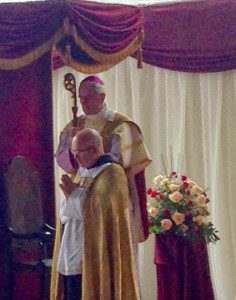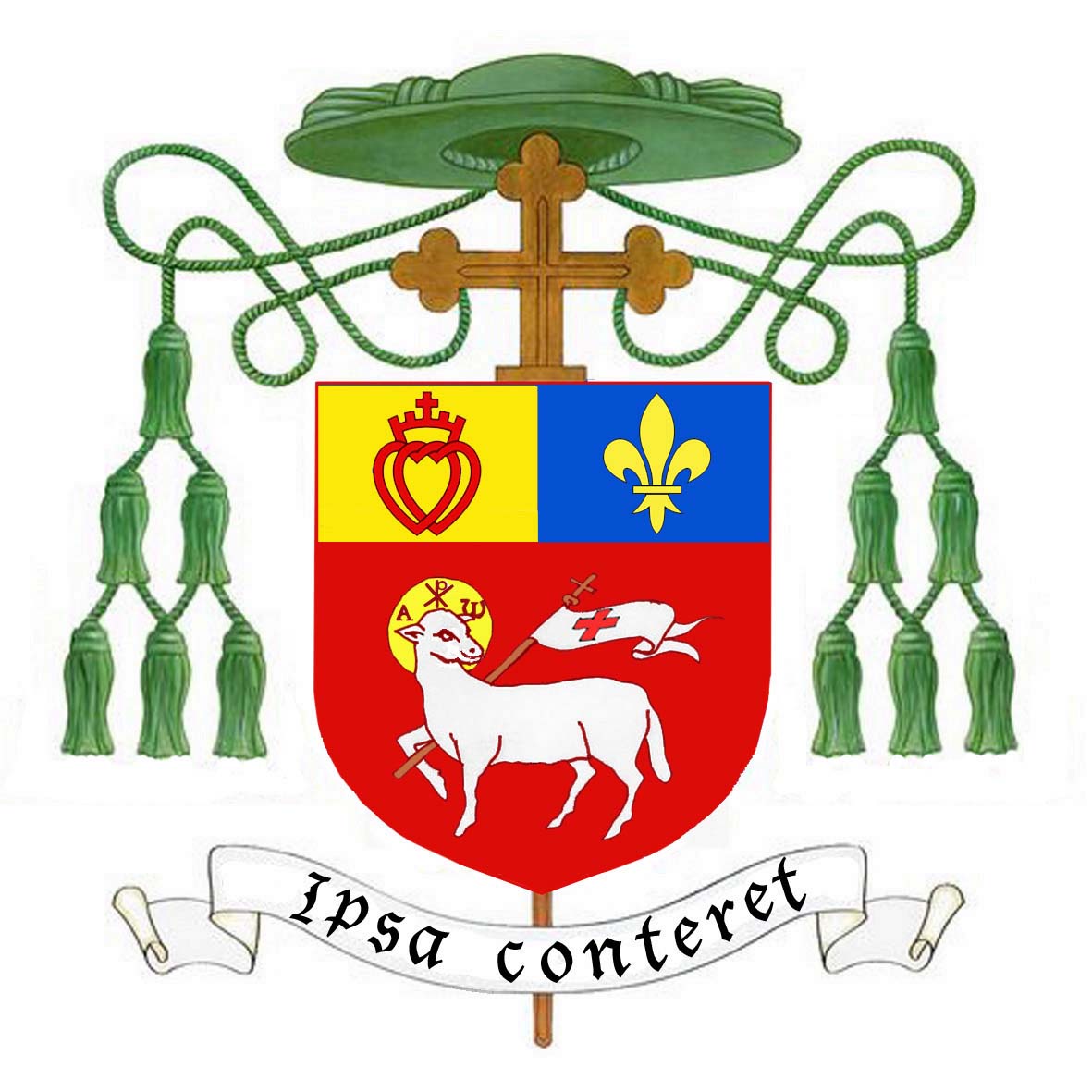The sermon of Bishop Williamson for the Episcopal Consecration of Fr. Faure
Translated by Michael ( cruzadoparalaverdad@gmail.com )
Pictures compliments of nonpossumus-vcr.blogspot.com/2015/03/consagracion-de-monsenor-faure.html
In nomine Patris, et Filii, et Spiritus Sancti. Amen.
Forgive me that I do not speak Portuguese. I have to speak Spanish instead, and I hope that all will be able to understand. For this very great feast day of St. Joseph who, after the Most Holy Virgin, is the greatest of all Catholic saints, and is Patron of the Church — well I had not thought particularly in this, but the fact is there – it is for this feast of the Patron of the Church that we meet here today to look after the consecration of what I suppose we call the Resistance.
Brothers and sisters, the fact is that the Truth, the Truth of God, the Truth of Christ, the Truth of the Church, is today in grave danger. In the first place, of course, there is the 2nd Vatican Council. The fact is that, since already some centuries ago, the enemies of God were preparing a new world, what we call today the New World Order. It’s a completely different world. And they want this to take the place of the world of God. It is God who created nature and who created all of these things. It is not man. God is the Creator of man and the Master of the Universe. The Master of masters, the Lord of lords, the King of kings is God and not man. Saint Pius X said that “the grave problem of the modern world is that it wants to substitute God.” It is true. It wants to take the place of God. And so, after some centuries, in the beginning, the Church and the popes could not withstand this treachery but the world has constantly handed itself over more and more to the ‘glory of man’ and has tried to snatch away the glory of God.
And finally being surrounded by these enemies, the churchmen, at the Second Vatican Council tried to change the religion of God ; and the contamination was there so deeply that the great majority of bishops in the Council went along with trying to end Tradition. Incredible ! – but not incredible for someone that understands just how profound the corruption of the modern world is. This corruption has even penetrated inside the Church ; and the great majority of churchmen have fallen, particularly the popes: John XXIII, Paul VI and the popes after the Council, John Paul II, Benedict XVI, and now Pope Francis who is the most evidently revolutionary of all of these popes but has participated with the very same principles of his predecessors since the Council. It is like saying that deep down Pope Benedict XVI is just as revolutionary as Francis, but with Francis only it is much more evident. His subjective intentions within him, only God can judge, but objectively, objectively they are traitors of the true religion of God.
There was one bishop that resisted and remained faithful and today in particular all that are here today appreciate him very much : his character and his faith, his fidelity to Our Lord, Our Lord of the true religion of God: Archbishop Lefebvre of course. And without him we would not be here today. It is evident. And what he did at the end with his resistance was exactly his consecration of 4 bishops in 1988. And when he preached in that ceremony, he said that what we are doing here is “Operation Survival” instead of “Operation Suicide”. If we had made a compromise with the Second Vatican Council, if we had made this compromise, we would have committed the suicide of the resistance to it. So that our resistance, the good resistance to the lie, the good resistance to the lie and the resistance that maintains the Truth, we must never forget this. And he was saying that if we also make this compromise with the Council, it would be Operation Suicide, and instead we consecrate bishops to secure Operation Survival of the Faith, of the Truth, in a world of lies where there is no truth, in a world of lies, deceit, treachery, we commit the act of consecrating bishops to defend the Truth, for the reason of defending the Truth. If the Catholic Faith was not the true, we would not be Catholics, the reason is that it is the Truth, and the Truth, of course, is the Faith, the Catholic Faith.
And today what are we doing? It is nothing more than the extension in modern times, that is 25 years later, the extension of Operation Survival. It is nothing more. It is like saying in a certain sense: we are only repairing the emergency light of Archbishop Lefebvre. There was the Church with its great human, electronic light, and this light was turned off, and Archbishop Lefebvre turned on the emergency light, and now with the SSPX, today the Society is also giving in to the compromise of the Second Vatican Council. They want to associate themselves, or they want to be united with the Romans, they want to follow the Romans. The Society has not yet died, it is not yet dead, but it is dying on the road, it is headed down. Maybe it will leave this path and return to the path of Archbishop Lefebvre, that is the way of defending Truth. That it may return to defend the Truth. But so many men today have lost the Truth and it is the fundamental element of the crisis of the modern world. Men have lost the sense of the Truth. Because Truth is the correspondence between my soul and reality, and modern man lives his virtual life in a bourgeois way. All of these phones and technology have created a plastic, artificial world, and the sense of the Truth is lost! There is a lack of peasants with sane judgement to live through what is to come. And what is being done by the Church today, today the falsehood; and the way that the Society wants to take is a falsehood. But they do not see it. They do not see it. So we have to play the role of repairers of the emergency light. It is not a glorious role! We do not save the Church! We do not have that pretension. In no way whatsoever do we have the pretension of saving the Church. No, no, no! Only God can save His Church today and He will do it. And in His time and His terms. But up until now God is purifying His Church, and He wants us to do what we can to save and maintain the treasures of the Church in order to be able to hand them over once more when the churchmen will have been truly corrected and enlightened by God. And He will do it but probably by means of an unimaginable chastisement because the momentum of the grave reality, of destitution, of the grave world of modern man is only leaving reality and if it doesn’t happen, everything remains a dream, a dreamworld. And so we do what we can.
We are thankful to Father prior, Fr. Thomas Aquinas OSB, for this beautiful ceremony, and this makeshift, metal cathedral. Such a great improvisation. And that is how it is said, where there is a will, there is a way. And if we desire to remain faithful to God, He will find us in the right path. It is impossible that God abandons souls that have not abandoned Him. That means that it is not God that abandons us. It can only be us if we abandon Him. That God may impede it! We are thankful to Father. We are thankful to the sisters that have worked so much to constitute this improvised cathedral. We are thankful to the monks that have also worked so hard to help bring about this ceremony and have done very well. And that is how it is.
Tomorrow and after tomorrow maybe there will be more treachery, so very possible, if things continue as they are headed, it is very possible, but it does not matter. Each day keep going. Today we will continue being faithful and we are very thankful for all who have come, some from very far away. Forgive me that we did not want to publicize the fact beforehand, but we wanted to secure and protect the ceremony. We wanted to protect the ceremony from any impediments that could have arisen because not everyone likes this ceremony. It is very evident. And we actually expect that the devil detests this ceremony. So then the devil has many servants, and they might have been able to impede this ceremony. We could have waited and asked for a sign from Divine Providence like Archbishop Lefebvre did in 1988. In particular, for me it seems that the Church can not substitute bishops that can ordain priests and confirm adults and children.
So then, in the political situation of today of which the 3rd world war can come about at any moment, with some recent news from my country, England, that weapons of mass destruction have been prepared a long time ago to be dropped on Russia. It is madness! Madness. But men are insane and these liberals have the instinct of suicide, and the third world war is a ceramic product of this instinct of suicide. And it will come about, and when it happens, it is absolutely unable to know how the events will play out. And in this case, to only ordain and confirm seems to me to be something irresponsible. The world is not calm. It is very unstable and destabilized. We do not know how things will turn out. So then without publicity, without looking for glory in any way whatsoever, without wanting to gain attention from the world, in contrast, at least myself, I want only to hide from the limelight after this ceremony as much as possible without any pretension whatsoever. We are doing this in order to defend the Church.
Beloved faithful, beloved priests, and there are even priests from afar, the United States for example, others from all over Latin America, we pray to Saint Joseph, the great Saint Joseph so that he aids us, he who is most faithful, his example of faithfulness and protection and of lack of publicity, we don’t want publicity, do the best that one can do. We ask Saint Joseph that everyone, each one of us according to his vocation in life, understands how to remain faithful and strictly to the Son of God and His Most Holy Mother, the Most Holy Virgin.
In the name of the Father, and of the Son, and of the Holy Ghost. Amen.


